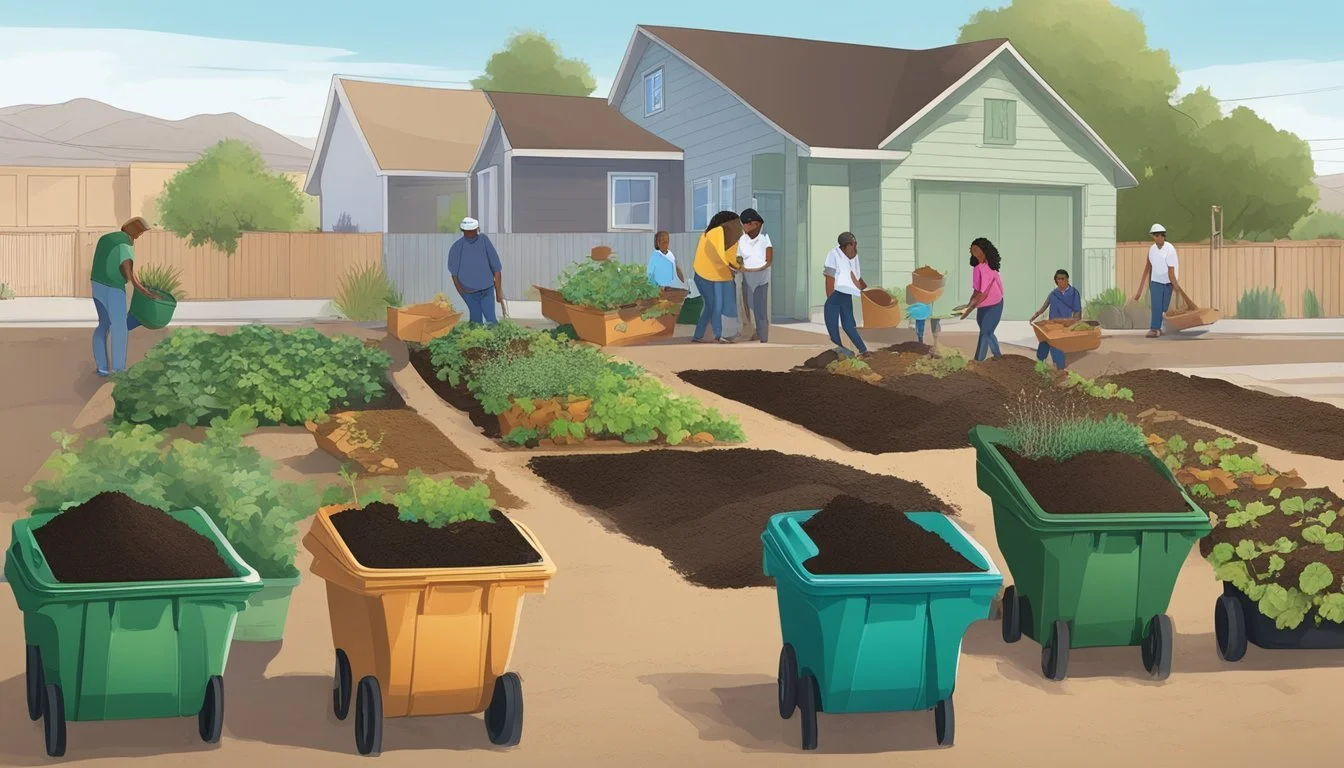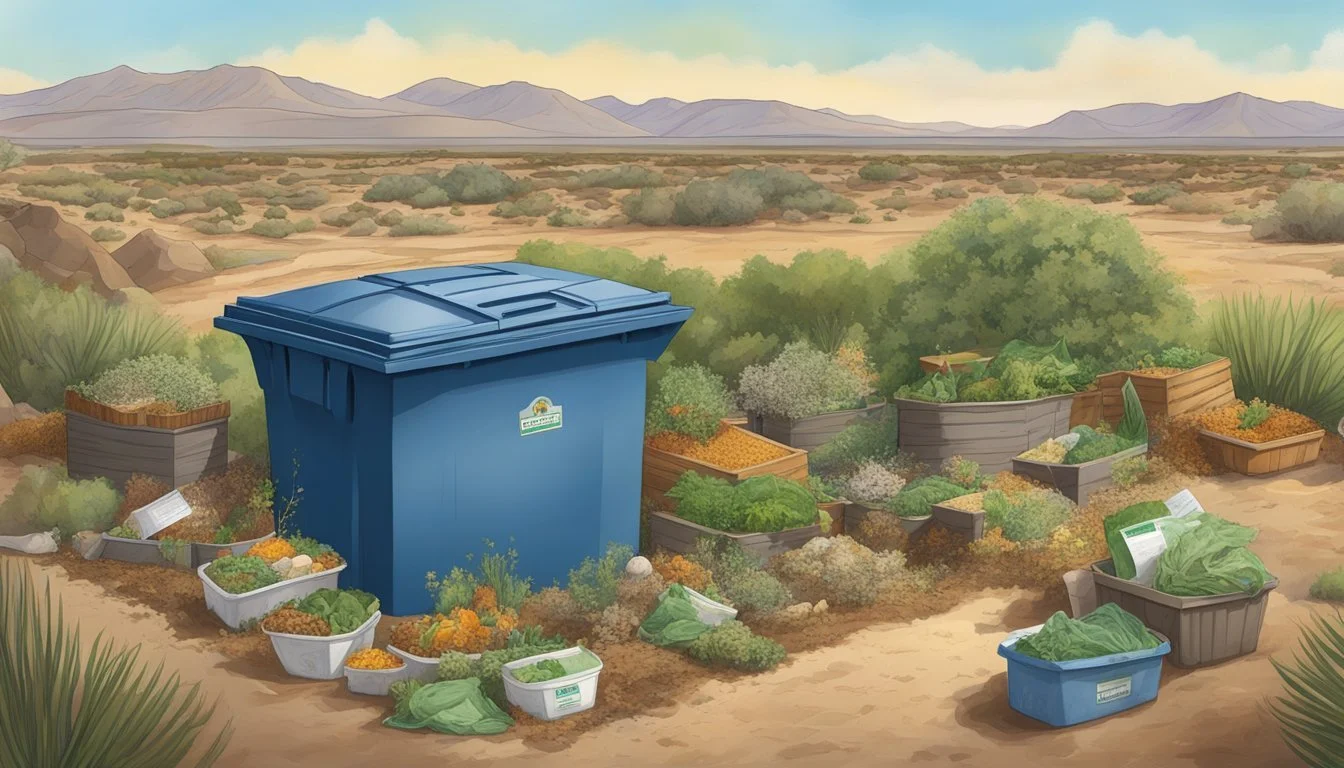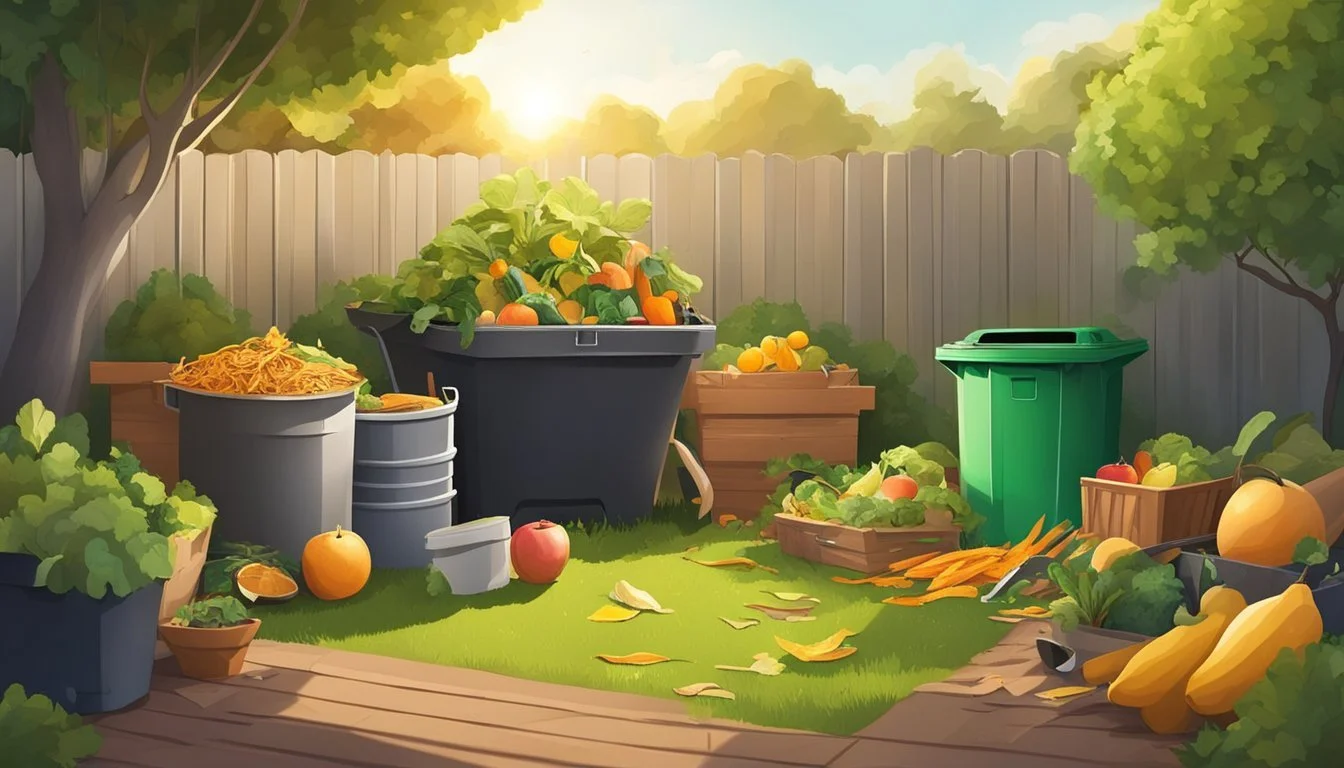Guide to Composting in Victorville, CA
Essential Tips for Desert Climates
Composting is rapidly gaining traction in Victorville as an environmentally sustainable practice to manage organic waste. With legislative mandates like Assembly Bill 1826 and Senate Bill 1383, Victorville residents are encouraged to participate in organics recycling programs that aim to reduce greenhouse gas emissions from landfills. This initiative supports the wider goal of fostering sustainability awareness and aligning with California's waste management objectives.
The city of Victorville has established guidelines and services that facilitate the composting process for both residential and commercial entities. Through initiatives like the Residential Organics Recycling Program, Victorville is improving resource efficiency and promoting a culture of environmental responsibility among its community members. Residents are provided with essential information on what materials are compostable and the best practices for participating in the city's organics recycling efforts.
Equipped with state-of-the-art composting facilities, such as the American Organics Composting Facility, the city is set to manage the organic waste of its growing population effectively. These facilities play a key role in diverting waste from landfills, enriching soil health, and supporting the local agricultural infrastructure. By transforming organic waste into valuable compost, Victorville is setting a precedent for sustainable living in the high desert region.
Basics of Composting
Composting is a process that converts organic material into a valuable soil amendment, accentuating the importance of balance between carbon, nitrogen, water, and air.
What Is Composting?
Composting is the natural breakdown of organic materials into a soil-like substance called compost. This transformation occurs through the work of microorganisms, such as bacteria and fungi, which decompose items like leaves, vegetable scraps, and grass clippings. The result is a nutrient-rich addition to soil that aids plant growth.
Benefits of Composting
Composting offers numerous benefits: it enriches the soil, helping retain moisture and suppress plant diseases and pests. Moreover, it can reduce the need for chemical fertilizers and encourage the production of beneficial bacteria and fungi. Composting organic materials also avoids their accumulation in landfills, where they take up space and release methane, a potent greenhouse gas.
Composting Principles
The effectiveness of composting is founded on four key principles:
Balance of Carbon and Nitrogen: Organic material is broadly classified into two categories: "greens" which are high in nitrogen, like food scraps and grass clippings; and "browns" which are rich in carbon, such as leaves and shredded paper.
Aeration: Introducing air into the pile is essential for composting, as oxygen aids microbial activity. Regular turning provides necessary aeration.
Moisture: Water is crucial in the decomposition process. The pile should be as moist as a wrung-out sponge.
Temperature: The temperature within the compost pile shows the activity level of the decomposition process. A warm pile indicates that the composting is proceeding properly.
Proper composting requires a mix of green and brown organic materials, sufficient moisture and aeration, and a temperature conducive to microbial activity. When in balance, these elements convert organic materials into compost that can be used to improve soil health.
Materials for Composting
In Victorville, CA, effective composting starts with knowing what materials can contribute to nutrient-rich compost and which items could hinder the process. Residents have the opportunity to transform their organic waste into valuable soil amendments through careful selection and balance of compostable materials.
Compostable Materials
Compostable materials are those that decompose naturally and benefit the composting process. These include:
Food Waste: such as fruit and vegetable scraps, plate scrapings, spoiled food, coffee grounds, eggshells, and more.
Yard Trimmings: like leaves, grass clippings, hay, and yard trimmings assist in creating a healthy mix.
Woodier Materials: small twigs and wood chips can add structure and aeration to the pile.
Organic Beddings: for those with animals, manure and the hay or straw bedding can be beneficial.
Paper: shredded paper and sawdust from untreated wood can provide a carbon source.
Materials to Avoid
Some items can contaminate the compost or disrupt the composting process, such as:
Non-Organic Materials: plastics, metal, glass, and any kind of trash should never be added.
Certain Organic Materials: meat, large bones, dairy, grease, or oil and materials labeled as "compostable" like bags and utensils.
Diseased Plant Material: can spread pathogens in the finished compost.
Palm Fronds: they decompose at a much slower rate and may not break down entirely in a residential composting setup.
Optimizing Your Compost Balance
For a thriving compost system, maintain a balance between green (nitrogen-rich) and brown (carbon-rich) materials:
Green Materials: food scraps, coffee grounds, and fresh yard waste provide nitrogen.
Brown Materials: such as leaves, straw, twigs, and shredded paper add carbon.
Water and Air: maintain adequate moisture and turn the pile to introduce oxygen, which is critical for decomposition.
By following these guidelines, Victorville residents can create quality soil amendments that will enrich their gardens while supporting the city's waste reduction goals.
Setting Up Your Composting System
When setting up a composting system in Victorville, CA, it's essential to choose the right method, find the best location, and understand maintenance requirements to produce healthy, usable compost effectively.
Choosing a Composting Method
Composting methods vary in complexity, size, and maintenance needs. For those with limited space, vermicomposting is efficient as it uses worms to break down organic waste into worm castings, a nutrient-rich end product. Alternatively, traditional compost piles are a straightforward approach requiring a balance of green and brown organic materials to foster decomposition.
Location & Setup
The size and location of your composting setup should accommodate easy access and proper environmental conditions. Composting facilities should be placed in a well-drained area with partial sunlight to regulate temperature and moisture, essential factors in pathogen breakdown. The footprint will depend on the chosen method; be it a compact worm bin for vermicomposting or larger designated areas for compost piles.
Maintaining Your Compost
Regular maintenance ensures efficient decomposition and prevention of odor or pests. Turn your compost pile weekly to aerate it, accelerating the breakdown process and controlling moisture levels. Monitor for signs of finished compost, which is dark, crumbly, and has an earthy smell. This indicates that the material is ready for use and free of pathogens. Proper maintenance ensures the successful transformation of organic waste into valuable compost.
Community and Residential Composting
In Victorville, CA, composting is a key component of waste reduction strategies, with city-wide initiatives catering to both community and residential needs. Focus is placed on diverting organic waste from landfills to foster local environmental resilience.
Community Composting Initiatives
The City of Victorville has embarked on a green campaign with Burrtec to enhance community-scale organics recycling. This joint effort is part of a broader strategy to increase local resilience by reducing landfill reliance and fostering sustainable waste management. This program not only seeks to manage community-generated organic waste but also educates residents on the importance of composting.
Residential Composting Tips
Residents in Victorville are encouraged to participate in residential organics recycling programs. Helpful tools and guides are provided to facilitate this process, including:
Proper Sorting: Lists of acceptable items for organic bins are provided to avoid contamination.
New Bin Delivery: A specialized organics recycling bin is delivered, along with a 'how-to' guide.
Reducing Waste: Encouragement of at-home composting for garden trimmings and food scraps.
Simple habits make a significant difference, such as maintaining separate bins for recyclable organics and regular trash. By following these guidelines, residents contribute to a sustainable community.
Composting Regulations & Support in Victorville
Victorville has implemented specific regulations to guide residents and businesses in composting practices, with resources available to facilitate compliance.
Local Composting Regulations
The city of Victorville, California, adheres to the Senate Bill 1383, which targets a significant reduction in the quantity of organic waste sent to landfills. Key mandates require all residential accounts, including multi-family complexes, to divert organic waste such as food scraps and garden trimmings away from landfill disposal, considering the potential for odors and environmental impact. To manage contamination, the city demands that organics be separated from solid waste, a move intended to bolster the efficiency of local composting facilities.
Support and Resources Available
Victorville's residents are supported through the provision of green waste containers and instructions on proper separation of compostable materials. For further assistance, individuals may contact the city's community services at 760-955-5087 to get help with container servicing as trash if contamination occurs. The composting facility operational details, like location and hours, are accessible for those interested in the role of composting within the recycling process or the generation of compost for agricultural use. The city's intention is to not just recycle but also to ensure that organically recycled materials benefit the community and environment alike.
Environmental Impact and Sustainability
In Victorville, CA, composting plays a significant role in the community's approach to sustainability and the environment. By diverting green waste and garden trimmings from landfills, the city reduces greenhouse gas emissions and creates beneficial soil amendments that promote agricultural and local ecosystem health.
Reducing Greenhouse Gas Emissions
Composting organic waste is a key strategy in Victorville for shrinking the city's carbon footprint. When green waste like food scraps and garden clippings are sent to landfills, they decompose anaerobically, producing methane—a potent greenhouse gas. The Residential Organics program in Victorville is essential in rerouting this waste to composting facilities, thereby lowering these emissions.
Promoting Soil Health and Local Resilience
Soil health is critical for sustainable landscaping and agriculture. Composting converts organic waste into soil amendments, which enrich the soil by improving its structure, nutrient content, and water retention. These advantages foster more resilient ecosystems. The city's organic waste disposal initiatives ensure that the derived compost supports farming and landscaping activities within Victorville and surrounding areas, thus closing the loop on local organic waste.
Composting and Waste Reduction
Victorville's approach to organic waste disposal is anchored in the principles of waste reduction and resource recovery. Through programs like the Mandatory Organic Waste Disposal Reduction, the city encourages households and businesses to compost. This not only minimizes the volume of green waste reaching the landfill but also transforms it into a valuable resource for sustainable landscaping and agricultural use, contributing to a more sustainable future.
Advanced Composting Topics
This section examines intricacies associated with larger scale composting operations, discussing the practicalities and scientific principles that govern these processes, and delves into necessary safety and sanitation measures.
Industrial and Commercial Composting
Industrial and commercial composting facilities, such as the American Organics composting facility, manage vast quantities of organic waste. Systems can typically handle hundreds to thousands of cubic yards of material, creating compost blends that often find their way to parks and agricultural sites for soil enhancement. The scale of these operations necessitates specialized equipment and methods that ensure efficient decomposition and high-quality compost.
Science of Composting at Scale
Composting at scale involves complex biochemistry and requires a balance of carbon to nitrogen ratios, moisture, oxygen, and temperature to optimize microbial activity. Large-scale operations, aiming for this balance, produce significant volumes of compost that benefit commercial and public-use areas, including parks. Monitoring these variables is crucial for producing a consistent and nutrient-rich compost product.
Safety and Sanitation in Composting
Safety and sanitation are paramount in large-scale composting to protect workers and the environment. Proper handling and processing of compost can mitigate health hazards, odors, and pests. Facilities like American Organics must comply with stringent regulations that govern aspects from air quality to leachate management, ensuring that their operations support public health and safety.
Services and Infrastructure in Victorville
Victorville has established a proactive approach towards sustainable waste management through dedicated composting programs and reliable household waste collection systems that encourage community participation and compliance with state mandates.
Composting Facilities and Services
American Organics Composting Facility, operated by Athens Services, stands out as one of Southern California's most advanced composting sites. This facility applies cutting-edge techniques to organic waste to create high-quality compost, which then helps build healthier soils. Furthermore, Victorville is committed to meeting the requirements of the statewide mandates from Assembly Bill 1826 and Senate Bill 1383. The city provides residential organics recycling programs that divert organic waste from landfills, thereby reducing greenhouse gas emissions.
Household Waste Collection & Management
The collection and management of household waste in Victorville are structured around the city’s initiative to minimize environmental impact. Athens Services is instrumental in this operation, providing waste services and waste collection to the community, ensuring proper delivery to the Victor Valley Regional Composting Facility. Victorville's trash-recycling department guides residents on what organics can be recycled, and offers assistance to maintain compliance with guidelines. By integrating these services with existing infrastructure, Victorville takes a significant step towards reducing its environmental impact and fostering a green future.
Frequently Asked Questions
In Victorville, residents often have questions about managing composting issues and correctly utilizing the nutrient-rich compost in their gardens. This section addresses common challenges and practical applications to ensure a successful composting experience.
Common Composting Problems and Solutions
Composting can sometimes present challenges such as bad odors or a lack of decomposition. Here's how to tackle some frequent issues:
Odor Problems: If your compost pile smells, it may be too wet or lack aeration. Balance the moisture by adding dried/dead plants or garden trimmings and turning the pile to introduce air.
Slow Decomposition: A pile that isn't breaking down efficiently might not have enough nitrogen. Incorporate green waste, like vegetable scraps or garden trimmings, to speed up the process.
Remember, never put plastic bags, even those labeled "compostable", directly into the compost pile as they typically require industrial facilities to break down.
How to Use Finished Compost in Gardens
Finished compost is a valuable addition to your garden, serving as a high-quality soil amendment:
Enhance Soil Structure: Mix the compost into the garden beds to improve soil fertility and texture, promoting root growth and water retention.
Mulching: Apply a layer of compost around plants to conserve moisture, suppress weeds, and provide a slow release of nutrients.
Always screen the compost before use to remove any unfinished material, ensuring that only the finest quality amendment is added to your gardens.
Conclusion
The launch of Victorville's residential organics recycling program represents a significant step towards environmental sustainability. It is anticipated to bring about considerable positive changes in waste management practices by diverting organic materials from landfills. Increased awareness and participation are crucial for the program’s success.
Implementing composting initiatives helps reduce greenhouse gas emissions. An effective organics recycling program can significantly lessen methane production, an outcome of organic waste decomposition in landfills. By converting organic waste into compost, Victorville aids in replenishing soil, which in turn supports local agriculture and landscaping with rich, organic material.
The American Organics composting facility showcases the culmination of modern technology and environmental stewardship. The process demonstrates how urban waste can be transformed into a product that supports soil health and reduces waste volume.
Residents have the power to influence Victorville's eco-footprint profoundly. Participation in the program is a testament to a community's commitment to sustainability and can set a precedent for other cities to follow.
The community's role cannot be understated. With the combined efforts of Victorville residents, businesses, and schools, the journey towards a greener city is well underway.









